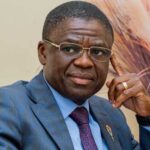
The 2016 revelations rocked governments, exposed high-profile personalities, triggered scores of investigations around the world and dealt a blow to Panama’s reputation as an offshore financial hub.
The defendants due to go on trial in a Panamanian criminal court include Jurgen Mossack and Ramon Fonseca Mora, the founders of the now-defunct law firm at the center of the scandal.
The leaked trove of 11.5 million files from their company Mossack Fonseca implicated influential figures including billionaires, politicians and even sports stars.
Icelandic prime minister Sigmundur David Gunnlaugsson was forced to resign after it was revealed his family had offshore accounts.
Then Pakistani prime minister Nawaz Sharif was disqualified for life from office after being implicated in the documents.
Others implicated included former British premier David Cameron, football star Lionel Messi, Argentina’s then president Mauricio Macri, Spanish filmmaker Pedro Almodovar, to name but a few.
The PUNCH reports that Nigerians linked to the secret firms from the data so far include ex-President of the Senate, Dr. Bukola Saraki, and his wife, Toyin; a former Governor of Delta State, Mr. James Ibori; a former Minister of Defence, Lt.-Gen. Theophilus Danjuma (retd.); former President of the Senate, Sen. David Mark; Africa’s richest man, Mr. Aliko Dangote, and his cousin, Sayu Dantata; as well as the late General Overseer of The Synagogue Church of All Nations, Prophet Temitope Joshua, and his wife, Evelyn.
Saraki, had in a statement issued by his Special Adviser on Media and Publicity, Yusuph Olaniyonu, however stated that he had, in his different asset declarations, included properties owned individually by himself and his wife, while the properties in question formed part of his wife’s family asset.
However, the claim game took a new twist when fresh documents published by Premium Times revealed that Saraki’s wife is allegedly a business front for her husband contrary to claims by the Senate President that the assets belonged to his wife’s family. The new documents the news medium got from Mossack Fonseca allegedly showed that assets in Toyin’s name in tax havens were held in trust for her husband.
Ibori was linked to four offshore companies, including Stanhope Investments, which he allegedly used to open a Swiss bank account. He was governor between 1999 and 2007. Ibori, who was convicted in 2012 for fraud totalling nearly £50m by a London court and is currently serving a 13-year prison sentence in the UK, allegedly used the Swiss account to channel funds for the purchase of a $20m private jet.
At least eight offshore companies in the British Virgin Islands have also been linked to the immediate past Senate President, David Mark, in a secret assets scam.
Mark had, however, denied any link to the firms and threatened legal actions against media organisations that published stories that linked him to the scam.
For Danjuma, who was alleged to be a long-time user of offshore entities, the Mossack Fonseca files have also linked him to some companies, some of which were registered when he was still in active service.
The database, Opencorporates, indicate that Danjuma served as director and vice-president of Cross Group Holdings International, which was registered in Panama on October 15, 1976, a time he was the Chief of Army Staff.
Also on the list is the General Overseer of The Synagogue Church of All Nations, Prophet Temitope Joshua; and his wife, Evelyn, who have been linked to an offshore company, Chillon Consultancy Limited, which was incorporated on June 20, 2006, on the British Virgin Islands.
However, Joshua’s spokesperson, Mr. Iwelunmor Patrick, denied the report, describing it as an attempt to smear the good name of the cleric. He said the only two institutions linked to Joshua were SCOAN and Emmanuel TV.
Dangote and Dantata, the founder of MRS Holdings, were also named among Nigerians who operate shell accounts in tax havens.
The spokesman for the Dangote Group, Tony Chiejina, had said Dangote never had any relationship with the offshore entities.
The files were leaked to a German newspaper, Sueddeutsche Zeitung, which shared them with the International Consortium of Investigative Journalists.
Many of those caught up in the scandal put forward reasons to explain their offshore presence and said they did not act illegally.
Even so, Mossack Fonseca said in 2018 that it would close due to “irreparable damage” to its reputation.
Panama has adopted new legislation since the scandal broke out, but the Central American country remains on a European Union tax haven blacklist.
The fact that part of its laws against money laundering did not exist when the Panama Papers revelations emerged could complicate efforts by the judiciary to achieve convictions.
In Panama, the crime of tax evasion has only been punishable since 2019 and for amounts greater than $300,000 annually.
In 2023, Mossack and Fonseca were tried in Panama for alleged money laundering in Brazil’s “Car Wash” corruption scandal involving construction group Odebrecht.
The prosecution requested up to 12 years in prison for both in that case. The sentence has not yet been announced.
The latest trial is expected to run until April 26, according to the judiciary.
AFP





